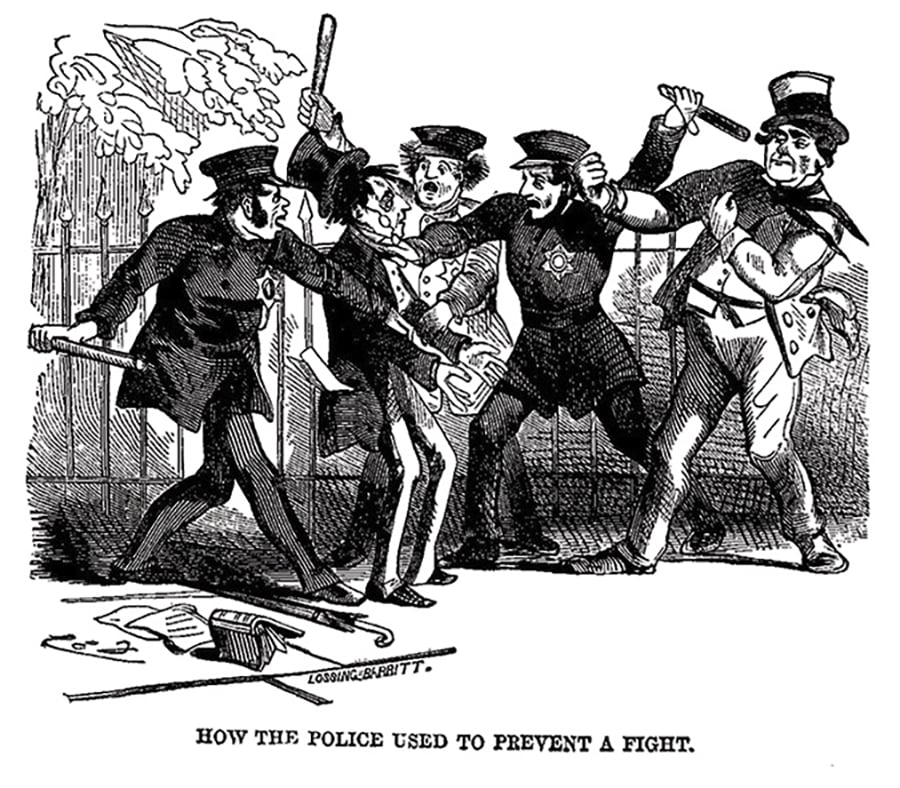From “What’s Wrong with the Right People?,” which appeared in the June 1929 issue of Harper’s Magazine. The complete article—along with the magazine’s entire 173-year archive—is available online at harpers.org/archive.
“There’s a lot of law at the end of a rope”: such was the gospel of the San Francisco vigilantes when they set out to clean up the crime wave of 1849. But theirs was a world of oxcarts and covered wagons; ours is one of automobiles and airplanes. So most things have moved along since then, yet the passage of many years has made little difference in the methods with which the “right” people deal with the “wrong.”
“There’s plenty of law at the end of a nightstick”: this has the vigilante ring to it, but was spoken by a recent New York police commissioner at the outset of the cleanup campaign with which he began his tenure. The only result apparent so far is a lot of indiscriminate clubbing and shooting by the police and a corresponding increase in murders and crimes of violence. No doubt these are violent days. We are all agreed on that. The question is, Who is responsible? Are the wrong people making the right people violent, or are the right people making the wrong people violent? Is it fifty-fifty?
From my seat on the sidelines it looks as though society were trying to out-gang the gangster, out-slug the slugger, and out-shoot the shooter, without pausing to ask whether it won’t result in simply pyramiding violence. The right people in press and pulpit are writing and preaching about the wrong ones; individuals high and low, from the chief justice of the Supreme Court to the smallest small-town reformer, are surveying and recommending, resolving and whereas-ing; legislators are legislating—while the police are pistoling and nightsticking, practicing violence as though it were the natural cure for crime.
Is there any justification anywhere, in any time, for believing this method will work? I don’t find it. Had the laws that the right people are making today been in effect fifteen years ago, I should never have had a chance to stop stealing and learn working. I should probably have been stopped by the rope, the chair, or a policeman’s bullet. Had I escaped these, I should be a lifer in some prison like Dannemora or Charlestown, spitting my lungs out against a whitewashed wall. I should be one of those jailbirds who perhaps had wronged society, and whom society, not understanding, had wronged back—with interest.
 My case is typical. Up to the age of fifteen I thought a policeman a hero, a person to be looked up to, trusted, and confided in. Then one evening, I was mistakenly “picked up, taken down, and thrown in” by one of them. The treatment I got in jail, from him and his fellow officers, shot that illusion all to pieces.
My case is typical. Up to the age of fifteen I thought a policeman a hero, a person to be looked up to, trusted, and confided in. Then one evening, I was mistakenly “picked up, taken down, and thrown in” by one of them. The treatment I got in jail, from him and his fellow officers, shot that illusion all to pieces.
I got my first lesson in violence that night. For twenty-five years I punished and was punished. I learned the game of violence thoroughly, from the police, the courts, the prisons. In the end I came to believe that I could survive only by using violence. And I came to know hundreds of reformed criminals, but not even one who was reformed by a policeman’s nightstick, a severe sentence, or prison cruelty. A brutal flogging in a Canadian prison and, years later, three days in a murderous strait-jacket in a dungeon in California certainly did nothing to turn my thoughts toward reformation. Meanwhile, all crooks are equal under the law in such places as England. There the offender is neither slobbered over by a lot of sentimentalists nor clubbed into a “confession” by the police. There police protection means protection of the Englishman. What is “police protection” coming to mean here?
Here the police-crook alliance discourages decent people and develops the latent larceny in all the rest. Yet the right people are all for bigger police forces, even as that would only multiply evil. What I am for is a better police force. By a better police force I mean one composed of men who have a less punitive and a more scientific attitude toward crime and criminals. But surrounded by an atmosphere of grift, with little chance of promotion except through favoritism, what chance can there be for a man to do intelligent, humane, and constructive police work?


